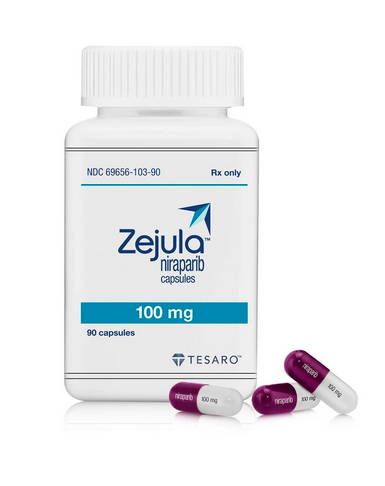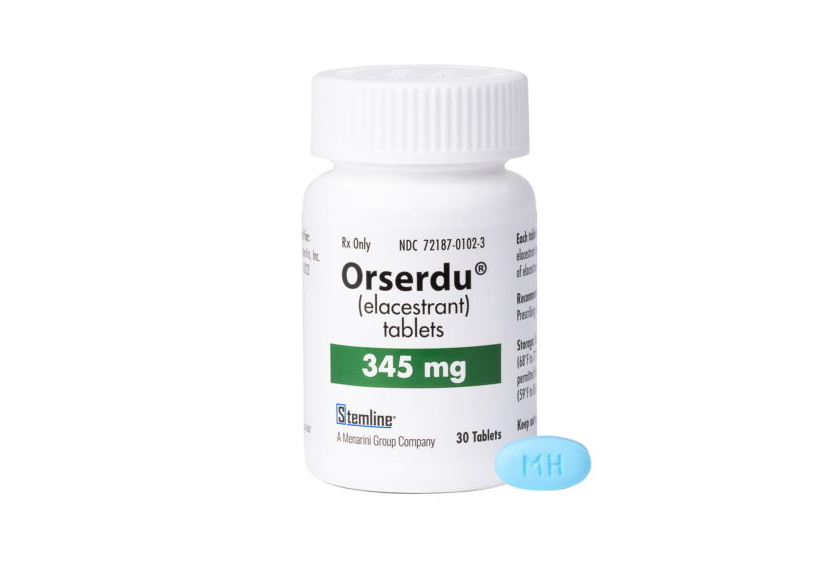Zejula (niraparib) vs Orserdu (elacestrant)
Zejula (niraparib) vs Orserdu (elacestrant)
Zejula (niraparib) is a type of medication known as a PARP inhibitor, primarily used as a maintenance treatment for adults with recurrent epithelial ovarian, fallopian tube, or primary peritoneal cancer who are in a complete or partial response to platinum-based chemotherapy. On the other hand, Orserdu (elacestrant) is an estrogen receptor antagonist indicated for the treatment of postmenopausal women or adult men with estrogen receptor-positive (ER+), human epidermal growth factor receptor 2-negative (HER2-) advanced or metastatic breast cancer with a specific ESR1 mutation. When deciding between Zejula and Orserdu, it is crucial to consider the type of cancer being treated, the molecular characteristics of the tumor, and the patient's previous treatments, as these medications are used for different indications and work through distinct mechanisms.
Difference between Zejula and Orserdu
| Metric | Zejula (niraparib) | Orserdu (elacestrant) |
|---|---|---|
| Generic name | niraparib | elacestrant |
| Indications | Ovarian, fallopian tube, or primary peritoneal cancer | Estrogen receptor-positive, HER2-negative advanced or metastatic breast cancer |
| Mechanism of action | Poly (ADP-ribose) polymerase (PARP) inhibitor | Oral selective estrogen receptor degrader (SERD) |
| Brand names | Zejula | Orserdu |
| Administrative route | Oral | Oral |
| Side effects | Thrombocytopenia, anemia, neutropenia, nausea, constipation, vomiting, abdominal pain, etc. | Hot flushes, nausea, fatigue, arthralgia, decreased appetite, etc. |
| Contraindications | Known hypersensitivity to niraparib or any of its components | Not provided |
| Drug class | PARP inhibitor | Selective estrogen receptor degrader (SERD) |
| Manufacturer | GlaxoSmithKline (GSK) | Radiant Pharmaceuticals |
Efficacy
Efficacy of Zejula (Niraparib) in Gynecological Cancer
Zejula (niraparib) is a poly (ADP-ribose) polymerase (PARP) inhibitor used for the treatment of certain types of gynecological cancers, including ovarian, fallopian tube, and primary peritoneal cancer. It is particularly effective in patients who have a specific genetic marker, the BRCA mutation, although its use has been expanded to include a broader patient population. Clinical trials have demonstrated that niraparib significantly improves progression-free survival in patients with recurrent epithelial ovarian, fallopian tube, or primary peritoneal cancer who are in a complete or partial response to platinum-based chemotherapy.
In a pivotal phase 3 trial known as the NOVA trial, niraparib was shown to be effective as a maintenance treatment, extending the time patients lived without their cancer progressing. For patients with a germline BRCA mutation, the median progression-free survival was significantly longer compared to placebo. Moreover, even in the non-germline BRCA mutant cohort, niraparib still provided a clinically meaningful increase in progression-free survival, indicating its efficacy in a wider range of patients with these gynecological cancers.
Efficacy of Orserdu (Elacestrant) in Gynecological Cancer
Orserdu (elacestrant) is a novel oral selective estrogen receptor degrader (SERD) that is being investigated for the treatment of estrogen receptor-positive (ER+) gynecological cancers, such as endometrial cancer. While elacestrant is not yet widely approved for use, clinical trials are ongoing to determine its efficacy in patients with advanced or metastatic ER+ breast cancer, which may provide insights into its potential use in gynecological cancers.
The efficacy of Orserdu in gynecological cancers is currently being evaluated, and there is limited published data specifically for this use. However, the mechanism of action of elacestrant, which involves targeting and degrading estrogen receptors, suggests a potential therapeutic benefit in ER+ gynecological cancers. As clinical trials progress, more data will become available to establish the efficacy and safety profile of Orserdu for patients with these types of cancers.
Regulatory Agency Approvals
Zejula
-
European Medical Agency (EMA), European Union

-
Food and Drug Administration (FDA), USA

-
Health Canada

-
Therapeutic Goods Administration (TGA), Australia

Orserdu
-
European Medical Agency (EMA), European Union

-
Food and Drug Administration (FDA), USA

Access Zejula or Orserdu today
If Zejula or Orserdu are not approved or available in your country (e.g. due to supply issues), you can access them via Everyone.org.
How it works

Make an enquiry
Choose the medicine you want to buy, answer a couple of questions, and upload your prescription to speed things up. We’ll get back to you within 24 hours.


Make an enquiry
Choose the medicine you want to buy, answer a couple of questions, and upload your prescription to speed things up. We’ll get back to you within 24 hours.


Breeze through the paperwork
We'll guide you through the required documents for importing unapproved medicine, ensuring you have all the necessary information.


Get a personalized quote
We’ll prepare a quote for you, including medicine costs and any shipping, administrative, or import fees that may apply.


Receive your medicine
Accept the quote and we’ll handle the rest - sourcing and safely delivering your medicine.

Some text on this page has been automatically generated. Speak to your physician before you start a new treatment or medication.
Let's talk
If you have any questions, call us or send us a message through WhatsApp or email:
Contact us




